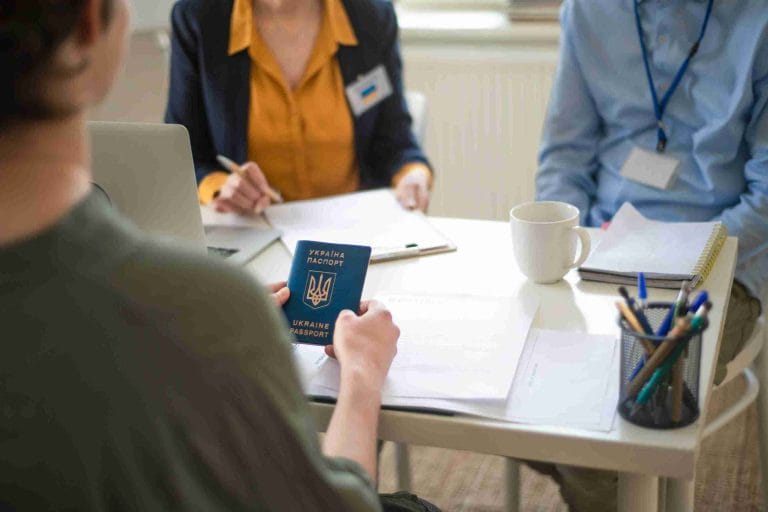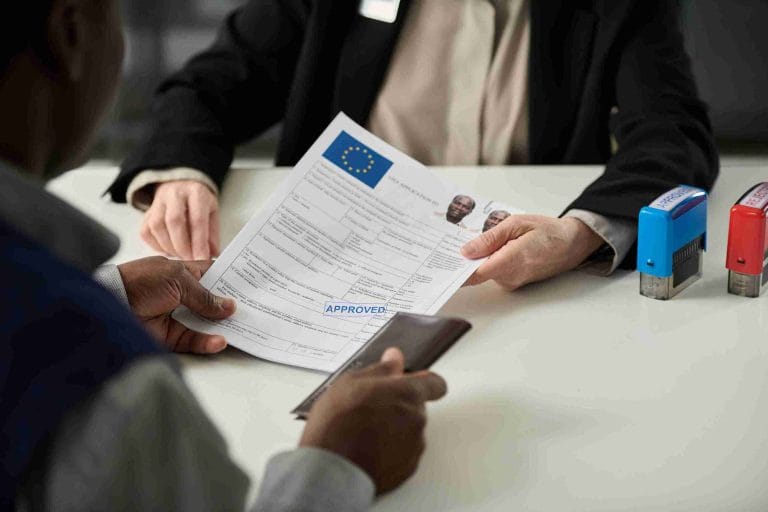What is a UK work visa?
A UK Work Visa is official permission that allows foreign nationals to live and work in the United Kingdom legally. It’s required for anyone who is not a UK or Irish citizen and plans to take up employment in the UK. There are several types of work visas, each tailored to different situations—such as the Skilled Worker visa for those with job offers in eligible roles, the Graduate visa for international students finishing UK degrees, and the Global Talent visa for leaders in academia, research, arts, or tech. To qualify, applicants typically need a job offer from a licensed UK employer, meet salary and language requirements, and provide proof of qualifications. The UK’s visa system is rules-based but frequently updated to reflect labor market needs and government policy.
Applying for a UK work visa also known as a UK work permit involves more than just meeting basic qualifications. Applicants must navigate employer sponsorship requirements, English language proficiency standards, financial thresholds, and sometimes, criminal record checks. Each step must be completed carefully to avoid delays, rejections, or legal complications.
At Salam Immigration, we aim to simplify this process. This blog offers a thorough breakdown of UK work permit requirements, how to apply, and what the process will cost in 2025. Our goal is to provide clarity, reduce confusion, and support you in making informed decisions about your future in the UK job market.
Eligibility Criteria for a UK Work Permit
To obtain a UK work permit, applicants must meet specific eligibility requirements. The primary route of the Skilled Worker visa has clear rules set out by the UK Home Office. Below is a detailed breakdown of what is required to qualify for this permit in 2025.
1. Job Offer from a UK Licensed Sponsor
A core requirement for the UK Work Permit is having a valid job offer from a UK employer who is registered with the Home Office as a licensed sponsor. The sponsor must provide a Certificate of Sponsorship (CoS), which includes details about the role, salary, and confirmation that the role meets the eligibility criteria.
Key details:
- The job must be genuine and full-time.
- The employer must be listed on the Register of Licensed Sponsors.
- The Certificate of Sponsorship must be issued no more than three months before the visa application date.

Keeping in mind the criteria can be troublesome, Contact Salam Immigration today for legal assistance.
2. Appropriate Skill Level and Occupation Code
The job must be on the list of eligible occupations and meet the minimum skill threshold, typically RQF Level 3 (equivalent to A-levels in the UK). Applicants must ensure the occupation code on their CoS matches their job role and qualifications.
Eligible occupations include (but are not limited to):
- Health and care workers
- IT specialists
- Engineers
- Teachers
- Skilled trades (e.g. electricians, welders)
3. Salary Threshold
Applicants must meet the minimum salary requirement. As of 2025, the general salary threshold is £38,700 per year or £15.88 per hour, but exceptions exist for roles on the shortage occupation list, new entrants, and certain healthcare jobs.
4. English Language Proficiency
All applicants must demonstrate proficiency in English at CEFR Level B1 or above. This can be proven by:
- Passing an approved Secure English Language Test (SELT)
- Holding a degree taught in English
- Being a national of a majority English-speaking country
You may also qualify if you or your parent were adopted, or if the birth occurred within or outside marriage in the UK.
However, it’s important to note that you cannot claim UK ancestry through step-parents.
5. Financial Requirements
Applicants must show they can support themselves without public funds. This means having at least:
- £1,270 in personal savings, held for at least 28 consecutive days before the application
6. Criminal Record Certificate
Certain occupations, such as healthcare, education, and social services, require applicants to provide a criminal record certificate from any country where they have lived for 12 months or more in the past 10 years.
7. Tuberculosis (TB) Test Results
Applicants from specific countries may need to provide TB test results from a clinic approved by the UK Home Office.
Keeping in mind the criteria can be troublesome, Contact Salam Immigration today for legal assistance.
People often get confused among the different types of visa but fear not, we at Salam Immigration are always here for your assistance. Contact us for further assistance.
Types of UK Work Permits
The UK offers a variety of work permit types under its points-based immigration system. While the Skilled Worker visa remains the most commonly used route for long-term employment, other work permits cater to different sectors, job durations, and applicant profiles. Below is a detailed guide to the major categories available in 2025.
1. Skilled Worker Visa
This is the primary route for overseas nationals seeking to work in the UK in a long-term, skilled role. It replaced the Tier 2 (General) visa and requires sponsorship from a licensed employer.
Key features:
- Valid for up to 5 years, renewable
- Pathway to settlement (Indefinite Leave to Remain)
- Allows dependants (partner and children)
- Covers jobs in health, engineering, IT, finance, and more
2. Health and Care Worker Visa
This subcategory of the Skilled Worker visa supports the UK’s health and care sectors. It offers reduced visa fees and exempted Immigration Health Surcharge (IHS) costs.
Eligible roles include:
- Nurses
- Care workers
- Paramedics
- Adult social care professionals
Benefits:
- Fast-track application process
- Lower salary thresholds for eligible roles
- No IHS for applicants and dependants
3. Global Business Mobility Visas
These routes are for businesses transferring overseas staff to the UK. They include several subcategories:
- Senior or Specialist Worker visa
- Graduate Trainee visa
- UK Expansion Worker visa
- Secondment Worker visa
- Service Supplier visa
Each has different conditions, but all require sponsorship and are not direct routes to settlement.
4. Graduate Visa
Open to international students who have completed a UK degree. It allows graduates to stay and work (or look for work) for:
- 2 years after undergraduate or master’s level study
- 3 years after a PhD
This visa doesn’t require employer sponsorship and gives flexibility in job choice, but it is not extendable or a route to settlement.
5. High Potential Individual (HPI) Visa
This is designed to attract recent graduates from top global universities. No job offer or sponsorship is required.
Eligibility:
- Graduated within the last 5 years
- From a university on the UK’s approved list
- Validity: 2 years (3 years for PhDs)
6. Temporary Work Visas
These include short-term work routes for specific purposes:
- Seasonal Worker visa: agriculture, horticulture
- Creative Worker visa: artists, entertainers
- Charity Worker visa: unpaid voluntary work
- Government Authorised Exchange visa: training, internships
- Religious Worker visa
These are not settlement routes and typically last 6–24 months.
7. UK Innovator and Founder Visa (for entrepreneurs)
While not a traditional work permit, the UK Innovator and Founder visa allows entrepreneurs with innovative, scalable business ideas to establish businesses in the UK. Requires endorsement from an approved body.
People often get confused among the different types of visa but fear not, we at Salam Immigration are always here for your assistance. Contact us for further assistance.

Step-by-Step Guide to Applying for a UK Work Permit
Applying for a UK work permit involves several detailed steps. A mistake or omission at any stage can delay or derail the process. Below is a comprehensive, step-by-step guide that walks you through how to apply for a UK work permit in 2025.
Step 1: Confirm Eligibility
Before applying, ensure you meet all eligibility requirements:
- You have a valid job offer from a UK-licensed sponsor.
- Your job meets the appropriate skill level and salary threshold.
- You satisfy the English language requirement.
- You have sufficient maintenance funds or employer certification.
- You meet additional requirements (e.g., TB test, criminal record certificate, if applicable).
Step 2: Obtain a Certificate of Sponsorship (CoS)
Your UK employer must issue a Certificate of Sponsorship. This electronic record contains a unique reference number required for your application.
Key details in the CoS:
- Sponsor license number
- Job title and occupation code
- Salary and working hours
- Start and end date of employment
- Confirmation of maintenance if the employer is covering initial expenses
Step 3: Gather Required Documents
You will need to prepare the following:
- A valid passport or travel document
- Certificate of Sponsorship (CoS) number
- Proof of English language ability (e.g. SELT result, UK degree, nationality)
- Proof of personal savings (bank statements or sponsor confirmation)
- Tuberculosis test results (if applicable)
- Criminal record certificate (for certain occupations)
- Proof of relationship for dependants, if applying with family
All documents not in English or Welsh must be accompanied by a certified translation.
Step 4: Submit Your Online Application
Applications for most UK work permits must be completed online via the official UK government website: gov.uk.
- Select the correct visa route (e.g. Skilled Worker visa)
- Create an account and fill out the online form
- Pay the visa application fee and (if applicable) the Immigration Health Surcharge
- Book a biometric appointment
Step 5: Pay Fees
Application fees vary depending on your visa type, job role, and length of stay. These will be covered in more detail in the next section, but typical costs include:
- Visa application fee
- Immigration Health Surcharge
- Priority service fee (optional)
Step 6: Attend a Biometric Appointment
You will need to visit a Visa Application Centre (VAC) in your country to provide:
- Fingerprints
- Digital photograph
- Supporting documents (in some cases)
Step 7: Wait for a Decision
Most Skilled Worker applications are processed within 3 weeks if applied from outside the UK, or 8 weeks if applied from within. Priority services may reduce the processing time to 5 working days or 24 hours.
You will receive a decision letter and, if approved:
- A visa vignette (sticker in your passport for entry)
- A BRP (Biometric Residence Permit) to collect once in the UK (if applicable)
Step 8: Enter the UK and Start Working
Once you receive your vignette, you can enter the UK within the 30-day window or as specified on your visa. After arriving:
- Collect your BRP from the designated Post Office (if required)
- Register with your employer and provide all right-to-work documentation
- Begin your role
Keeping in mind all the steps for application can be a real headache. But why do it yourself when we can help you.Contact us today for assistance in this regard.
Keeping in mind all the steps for application can be a real headache. But why do it yourself when we can help you.Contact us today for assistance in this regard.
Switching to a UK Work Permit from Another Visa Route
The UK immigration system allows individuals already residing in the UK on other visa types to switch to a UK work permit, provided they meet the relevant criteria. This flexibility is especially beneficial for students, intra-company transferees, or temporary workers who receive job offers from licensed UK employers.
Here’s how the process of switching to a UK work permit, particularly the Skilled Worker visa, works in 2025.
1. Who Can Switch?
You can apply to switch to a UK work permit if you’re in the UK on one of the following visa types:
- Student visa to work visa (formerly Tier 4)
- Graduate visa
- Intra-Company Transfer visa (now part of Global Business Mobility)
- Start-up visa
- Innovator Founder visa
- Tier 5 (Temporary Worker), under certain conditions
- Dependant of a Skilled Worker or other primary visa holder
- Family visa (in some cases)
2. Application Process for Switching
The process is similar to applying from outside the UK but with some differences:
Step-by-step:
- Secure a job offer from a UK-licensed sponsor
- Receive a Certificate of Sponsorship
- Apply online via the Home Office website
- Pay the appropriate visa fee and Immigration Health Surcharge
- Book and attend a biometric appointment at a UK Visa and Citizenship Application Services (UKVCAS) centre
- Wait for a decision
- Processing time: Usually within 8 weeks (or faster with priority services)
3. Fees When Switching in the UK
The costs are generally the same as applying from outside:
- Visa fee: £719 (up to 3 years), £1,420 (over 3 years)
- Immigration Health Surcharge: £1,035 per year
- Priority service (optional): £500 for 5-day processing
- Super priority service (optional): £1,000 for next-working-day processing
Extending or Renewing a UK Work Permit
If you’re already in the UK on a Skilled Worker visa or other eligible work permit, you may be able to extend or renew your stay. Extensions are essential for individuals wishing to continue working in the UK beyond their initial visa period and for those planning to qualify for settlement (Indefinite Leave to Remain).
This section covers everything you need to know about extending your UK work permit in 2025, including eligibility, process, costs, and considerations.
1. Who Can Extend Their Work Permit?
You can apply to extend your UK work permit if:
- You continue to work for the same employer who originally sponsored you
- Your job remains in the same occupation code
- You meet the salary and skill requirements at the time of extension
- Your visa has not yet expired
2. When to Apply for an Extension
You should apply before your current visa expires. Ideally, apply no earlier than 3 months before the visa end date to avoid unnecessary overlaps or issues.
Failing to apply in time may result in loss of lawful immigration status and restrictions on future applications.
3. Requirements for Extension
To qualify for a Skilled Worker visa extension in 2025, you must:
- Be in the UK legally under a current valid Skilled Worker visa
- Have an updated Certificate of Sponsorship from your employer for the extension period
- Continue to meet the salary threshold (usually £38,700/year or appropriate discount rate)
- Prove English language proficiency, only if not proven in the previous application (this is rare)
4. How to Apply for an Extension
Step-by-step process:
- Your employer issues a new Certificate of Sponsorship
- You complete the online application for a visa extension via gov.uk
- Pay the visa extension fee and IHS
- Book and attend a UKVCAS biometric appointment
- Submit any updated supporting documents (if required)
Processing time: Up to 8 weeks (standard), or faster with priority services
5. Fees for Extensions
Extension costs are the same as initial applications:
- Up to 3 years: £719
- More than 3 years: £1,420
- IHS fee: £1,035 per year of extension
- Priority services (optional): £500–£1,000
Employers must still cover:
- Certificate of Sponsorship fee: £239
- Immigration Skills Charge: £1,000/year (or £364/year for small sponsors)
6. After Your Extension Is Approved
- You’ll receive a new BRP or updated digital visa status
- Your visa conditions remain the same, including work rights and access to public services (excluding benefits)
- Your time on the visa continues counting toward settlement eligibility
It is normal to get confused by all these legal proceedings,well we at Salam Immigration are always here for your assistance. Contact us for any legal assistance.








